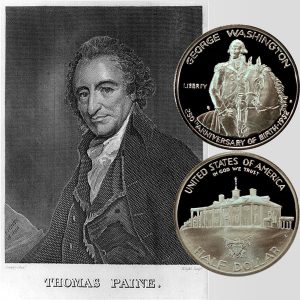Today, the Washington Commemorative Silver Half Dollar Coin remembers when the General faced overwhelming odds and Thomas Paine produced his first “Crisis” on December 19, 1776 exhorting the people to help.
From Volume II of The United States, Its Beginnings, Progress and Modern Development by Jesse Ames Spencer, published in 1912:
=====
Even with these reinforcements and a body of Pennsylvania militia which had also arrived, the army under Washington did not exceed 7,000 men; for while these reinforcements were coming in, almost an equal number were leaving. Moreover, of those who remained a large part were raw troops, ill-equipped, ill-fed and all thoroughly dispirited and disgruntled.
The British, to the number of 27,000 men, well provided and flushed with success, lay on the opposite bank of the Delaware, stretching from Brunswick to the vicinity of Philadelphia, ready to attack upon a moment’s notice and apparently about to begin operations for the capture of Philadelphia.
Undoubtedly, this was one of the darkest periods of the contest and the American forces appeared to be in a hopeless condition.
It was at this time that Thomas Paine published the first number of The Crisis (December 19, 1776), the words of which were electrical and soon became classic.
“These are the times that try men’s souls. The summer soldier and the sunshine patriot will, in this crisis, shrink from the service of his country; but he that stands it now, deserves the love and thanks of man and woman. Tyranny, like hell, is not easily conquered; yet we have this consolation with us, that the harder the conflict, the more glorious the triumph.”
While Paine was exhorting the Americans to still greater efforts, they were cast into deeper gloom by the news that General Clinton, with two brigades of British and two of Hessian troops, escorted by a squadron of war ships under Sir Peter Parker, had been sent against Rhode Island, and that, because of the small number of the American forces there, had successfully accomplished the subjection of that colony.
The American troops in Rhode Island were incapable of making an effectual resistance and retreated upon Clinton’s approach.
On the day that Washington crossed the Delaware, Rhode Island came into the possession of the British under Clinton almost without opposition.
This was a very serious loss, not only because of the situation of the province but because the American naval vessels then in the Providence River under command of Commodore Esek Hopkins were compelled to withdraw up that river to escape capture by the British men-of-war.
There they continued to be blockaded for a long time, and consequently were of no use in the present crisis.
While the British were able to capture two pieces of cannon, but few prisoners were taken, as the people had sufficient warning of the approach of the British to escape to places of safety. The situation of Rhode Island made it an excellent base of operations for the British, for from this province they were able to harass Massachusetts and Connecticut.
They also succeeded in detaining the reinforcements that General Lincoln had assembled in the first State to send to Washington’s aid, and in detaining the reinforcements which had been collected in Connecticut and which were at that moment ready to march toward the South.
Howe’s best plan of campaign would have been to push the Americans with greater activity, but, as before noted, his entire conduct as commander-in-chief was distinguished by dilatoriness.
Had another general been in command of the army, undoubtedly Washington would have been overwhelmed before he had passed the Delaware.
The troops in Rhode Island also would have separated the New England colonies from the Middle and Southern, and would have placed them in a complete state of subjugation to British authority.
As it was, however, the delay of the British saved the American army.
Howe conducted his operations with cool prudence rather than by daring enterprise or unwary impetuosity, and had he not been handicapped by the orders of the ministry at home, he would have been more successful in his operations against Washington’s army.
Credit must be given him, however, in that he did not expose himself to any of those disasters which befell the commanders who succeeded him.
Whatever may have been the faults and short-comings of the British general, it is certain that Washington displayed superior generalship in his conduct of the retreat across New Jersey, for the British were not laboring under the conditions with which the American general had to contend.
Probably had any other man than Washington been at the head of the American forces at this time, the cause would have been abandoned, even by such troops as clung to the commander-in-chief.
It was because of his remarkable personality and his vast influence with the troops that the little patriot band continued the arduous struggle.
=====
The Washington Commemorative Silver Half Dollar Coin shows with an artist’s portrayal of Thomas Paine, circa 1790.
